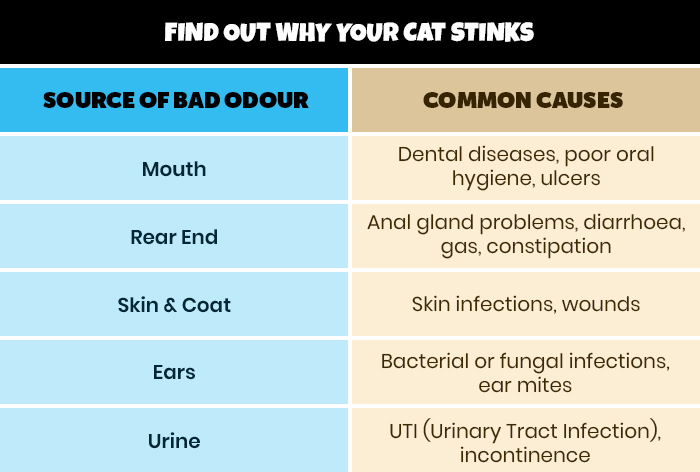Why Does Your Cat Stink? Find Common Causes and Solutions
Cats are pristine creatures with a master’s degree in self-grooming, and they love to keep themselves clean. So, if a cat stinks suddenly, it’s usually a sign that something’s not right, and your cat might be trying to tell you something. If you’ve recently found yourself asking, “Why does my cat smell bad?”, then you have got all the right reasons to dig deeper into the cause.
Cats can smell for various reasons, from poor hygiene to infections and illness, and so you must address the problem before it turns into a serious health hazard. In this blog post, we will discuss some of the common causes of why cats stink and what you can do to get your cat smelling fresh again.
Common Causes of Cat Odours & Their Solutions
If you have recently caught a whiff of something nasty when your cat walks by, it might be a call sign that your cat is asking for your help. Bad odour in cats can be caused by a variety of factors related to different parts of the body. Let’s figure out what’s going on behind that malodour and how you can fix these issues easily.
Mouth
Why does my cat’s mouth smell bad? One of the most common (and smelliest) culprits of foul breath in cats is poor dental hygiene. If you’re not brushing your cat’s teeth regularly, over time it can lead to plaque buildup, dental diseases, infections, and even tooth abscesses, all of which can produce a foul odour. In rare cases, ulcerations, kidney disease, and diabetes can also develop unpleasant odours.
What can you do?
Start with a good dental hygiene routine for your cat. If the condition persists, it’s time to book a vet consultation. They may recommend a professional dental cleaning for tartar removal, antibiotics if there’s an infection, or possibly tooth extractions in severe cases. If you cannot brush your cat’s teeth regularly (and honestly, who has the time sometimes?), offer them tasty cat dental treats daily to keep their mouth fresh.
Rear End
Is it normal for the cat’s rear end to smell bad? Absolutely not! If the bad smell is coming from your cat’s bottom, it may be coming from faecal/urine deposits in the dirty, matted hair down there; in this case, it’s safe to blame poor grooming. If that’s not the case, the problem is likely in the gut or anus. Anal glands are sacs that release a putrid liquid used to mark the cat’s territory. When anal sacs are infected, they cause fishy, metallic odours.
What can you do?
Trim or gently clean your cat’s bottom area with cat-safe wipes. If the matting is serious, consider visiting a professional groomer. If you notice any signs of stomach upset or anal gland problems, such as scooting, watery stools, constipation, or flatulence, you must consult a veterinarian for timely treatment. Pro tip: Ask your vet to suggest an effective cat digestion supplement to support healthy digestion.
Skin & Coat
Why does my cat’s coat stink? Cats usually smell sweet and clean, which is why we all love burying our faces into their fluffy coats. But if you feel otherwise, and so, even after giving your cat a good bath, you have likely got yourself into dealing with a cat skin and coat infection. Cats can develop bacterial or fungal infections, especially if they have allergies, and can produce a musty, sour smell in their coat.
What can you do?
If your cat’s coat is smelly, bathe them with a naturally fragrant shampoo to remove any dirt from their coat. Noticed redness or odd patches on your cat’s skin? See your vet for prompt diagnosis and treatment. They may prescribe antibiotics, antifungal creams, or medicated washes to resolve the infection. If your cat is prone to flea allergy dermatitis, keeping them active on an effective cat flea treatment can help prevent future flare-ups.
Ears
Why do my cat’s ears have a foul smell? Ear infections in cats can often cause your cat to smell bad. If your cat is having an ear infection caused by yeast, bacteria, or ear mites, you might notice a strong, musty smell from your cat’s ears. Ear infections can cause discharge, odours, discomfort, scratching, head tilting, and may even lead to serious consequences like deafness.
What can you do?
If your cat has any signs of an ear infection, book a vet consultation without any delays. Your vet can examine the ear canal and recommend cat ear drops or cleaning solutions formulated to eliminate the infection. Sometimes, it’s tempting to insert cotton buds or try to clean deep into your cat’s ears at home – but skip it. Take help from a professional groomer or veterinary professional to clean the tricky spots.
Urine
Does cat pee always smell bad? Cat urine smell is never pungent or offensive. Generally, cat urine has an ammonia-like smell, but urinary tract infections (UTIs) in cats can cause their urine to smell putrid. If you notice an unusual odour or any other concerning symptoms, it’s essential to consult with a veterinarian promptly for proper diagnosis and treatment.
What can you do?
To manage the smell of cat urine and prevent urinary tract infections, regular cleaning of litter boxes is crucial. Consider using enzymatic cleaners and replacing the litter regularly. Additionally, ensuring proper hydration keeps their urine diluted, reducing strong odours in the urine.
Final Thoughts
Smelly fur? Don’t panic. Even the cleanest cats can get stinky sometimes, but the good news is that most causes are treatable with the right care. From professional dental cleanings to better grooming routines, a little attention can go a long way in getting your kitty back to their sweet-smelling self. If you’re ever in doubt, a trip to the vet is always the safest option. After all, your cat may not love the carrier ride, but they’ll thank you for the relief later.

